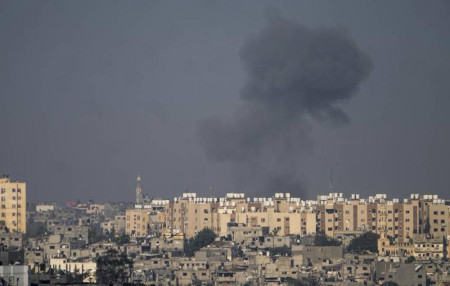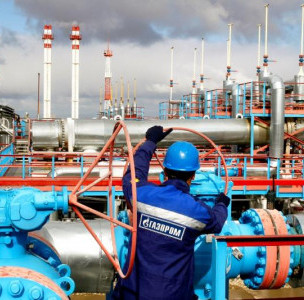
Arab countries are showing a cool reaction to the latest escalation in the Israeli-Palestinian conflict; NATO kicks off its annual nuclear military exercise in Europe; and the future of another Russian gas pipeline may be decided by China. These stories topped Tuesday’s newspaper headlines across Russia.
Izvestia: Arab countries show cool reaction to escalation of Israeli-Palestinian conflict
Russian President Vladimir Putin has held phone calls with the heads of several Middle Eastern countries involved in efforts to resolve the Israeli-Palestinian conflict, as well as with the leaders of the belligerents. Moscow’s approach is rooted in the need to adhere to the relevant UN Security Council resolutions, which call for the creation of two states, a Jewish state and an Arab state. In the meantime, Israel is preparing for a long war against Hamas, while Arab countries are showing a muted reaction to the conflict, Izvestia notes.
"All actions in Gaza are leading to civilian casualties, complicating the situation. One of the objectives that Hamas set for itself - which was to scuttle the process of normalizing relations between Israel and Saudi Arabia - has already been achieved. Hamas is openly talking about it, saying that it has achieved its goals and is now ready for negotiations. However, Israel is not ready yet," Andrey Chuprygin, a senior lecturer with the School of Asian Studies at the Higher School of Economics (HSE University), pointed out.
However, experts doubt that Hamas’ activities will lead to any reconsideration of the processes put in motion for normalizing relations between Middle Eastern countries. "This issue should be seen through the lens of the fact that the Arab world has long accepted Israel’s existence and is no longer seeking to destroy it. Israel is part and parcel of the geopolitical reality in the Middle East and nothing can be done about it. In fact, even Iran does not question Israel’s existence and the Palestinian issue is no longer a key agenda item in terms of Arab-Israeli relations, Sergey Demidenko, head of the School of Political Studies of the Institute for Social Sciences at the Russian Presidential Academy of National Economy and Public Administration (RANEPA), explained.
This is why most regional players are demonstrating a fairly cool reaction to the situation, the expert said. According to him, either Egypt or Jordan could ultimately play a key mediating role as both Arab countries maintain quite balanced relations with both Israel and Palestine.
Kommersant: Nuclear-themed NATO military exercise kicks off in Europe
NATO’s Steadfast Noon nuclear deterrence exercise kicked off on Monday. The ten-day drills, which are taking place in southern Europe, are expected to involve about 60 warplanes, including those capable of carrying nuclear weapons. When announcing the exercise, NATO stressed that it was an annual activity unrelated to any current developments. However, Moscow believes that the North Atlantic Alliance’s practices are increasingly taking on a confrontational posture, Kommersant writes.
The Steadfast Noon drills have been taking place annually for ten years, usually in October, but each time in a new place. Italy is one of the five NATO countries where US nuclear weapons are stationed (along with Belgium, Germany, the Netherlands and Turkey).
In recent years, when announcing the fall exercise, NATO has been highlighting its routine nature, focusing on the fact that the drills do not involve real nuclear warheads. However, the Russian authorities have stated that they will take NATO’s nuclear drills into account in their military planning.
According to Alexander Yermakov, an expert with the Center for International Security at the Russian Academy of Sciences’ Institute of World Economy and International Relations (IMEMO RAS), the main feature of the Steadfast Noon exercise is that "its information support is very modest by Western standards."
"It would be interesting to know whether the bloc’s newest or even future members - Finland and Sweden - are engaged in the exercise. I also wonder to what extent new equipment is being used in the drills, including European countries’ F-35 aircraft that are expected to become the main nuclear bomb carriers in the coming years. Unfortunately, we will probably have to figure it all out mostly in retrospect and from outside sources," the expert noted.
Rossiyskaya Gazeta: China may hold key to future of another Russian gas pipeline
The future of another major Russian-Chinese gas pipeline project, the Power of Siberia 2, may be decided at the upcoming meeting between Russian President Vladimir Putin and Chinese President Xi Jinping. The fact that Alexey Miller, CEO of Russian gas giant Gazprom, is accompanying Putin on his visit to China suggests that the parties are likely to raise the issue, Rossiyskaya Gazeta writes.
Technically, everything is ready to proceed with construction of the pipeline with a relevant gas supply contract the only missing element in the equation. Without one, however, it would prove impossible to commence building a pipeline with an annual capacity of 50 bln cubic meters. For reference, the Nord Stream gas pipeline to Europe, which was infamously blown up a little over a year ago, had a capacity of 55 bln cubic meters.
Moreover, it is not just the Chinese market that needs the gas pipeline. If built, it is expected that it would link Russia’s western and eastern gas transmission systems, which is important for developing the country’s gas infrastructure, enhancing its export potential in Asia and creating gas processing and liquefaction entities in Russia’s eastern regions. In addition, the route of a pipeline passing through Mongolia has already been agreed upon as the landlocked country is also interested in importing Russian gas.
In fact, it is only the initial capacity of the new gas pipeline that currently depends on China. National Energy Security Fund Director Konstantin Simonov points out that it would be advisable to wait until a contract is signed before starting any large-scale construction work. However, further postponement is no longer an option for the construction of infrastructure aimed at connecting Russia’s western and eastern gas transmission systems.
In Simonov’s view, there is also a political aspect. China has built major infrastructure facilities to receive liquefied natural gas (LNG) at its east coast ports but the risks it is facing are growing together with this market. The world’s largest LNG exporters - Australia, Qatar and the US - are not the friendliest countries for China. As for pipeline gas supplies from Turkmenistan, they are not unlimited. In addition, gas from Turkmenistan arrives in western China, where the issue of infrastructure construction is even more pressing than that of Russian gas being delivered to the country’s central region.
China never rushes to sign contracts. The country is a tough negotiator that stands firm to the end, but, that said, Beijing needs this gas, Dmitry Gusev, deputy chairman of the Reliable Partner association’s supervisory board, noted.
Kommersant: Georgia’s Constitutional Court finds grounds for impeachment of president
The Georgian government has gained a powerful ally in its standoff with President Salome Zourabichvili. The Constitutional Court has ruled that Zourabichvili violated the country’s constitution by visiting Belgium, Germany and France despite the government’s direct prohibition on doing so. Her political future now hangs on a parliamentary vote. However, it will be extremely hard for the president’s opponents to secure the required 100 votes to impeach her, Kommersant writes.
Avtandil Demetrashvili, former chair of the Georgian Constitutional Court and one of the drafters of the country’s constitution, told the newspaper that Zourabichvili "only formally violated the Constitution" and "made a tactical mistake," formally requesting the government’s permission for her foreign visits. According to him, had the president traveled to Europe without asking for the cabinet’s authorization, her trips could have been classified as private, especially since Zourabichvili went to Europe at her own expense and her visits were not financed from out of state budget funds.
However, Demetrashvili pointed to the political dimensions of the issue: The court’s ruling cannot take effect unless 100 members of parliament - two-thirds of the lawmakers - vote to impeach the head of state. Although chairman of the ruling Georgian Dream party Irakli Kobakhidze called Zourabichvili "a lame duck" after the court had announced its decision, he acknowledged that only 88 lawmakers were ready to vote for her impeachment. Neither of the opposition factions supports the idea.
Experts note that the Georgian Dream party and Zourabichvili have fundamentally different approaches to foreign policy. The president, who has taken a highly negative stance toward Russia, has been advocating for Georgia's European integration. "In the meantime, the Georgian Dream and its government, stuck between the West and Russia, are doing their best not to make any sudden movements so as to avoid unnecessarily irritating Moscow," David Avalishvili, an expert with the Nation.ge media outlet, said. In this regard, he pointed out that the ruling party had recently refused to vote for a resolution of the Parliamentary Assembly of the Council of Europe (PACE) that designated Russian President Vladimir Putin as "a dictator."
Izvestia: Russia maintaining leadership position in global grain market
Russian President Vladimir Putin stated that the country was most likely to retain its top position in terms of wheat exports. Experts believe that if the grain tariff is either adjusted or canceled, Russia will gradually start cultivating 150-180 mln tons of grain per year with up to 90 mln tons going toward exports. This would allow the country to challenge its competitors from Europe and North America, Izvestia writes.
"Agricultural exports have been growing steadily in recent years thanks to active government support and the effective work of export support institutions," a spokesperson for the Russian Export Center told the paper. "Our country occupies a solid place among the world’s top 20 leading food exporters and is also a major wheat exporter to the global market, largely determining market trends."
Russia currently leads the global grain market with a share of about 19.5%, Galina Sorokina, professor in the Department of the World Economy and International Economic Relations at the State University of Management, estimates. Russia’s closest rivals, Canada and the United States, have slightly over 13% of the market each. The issues that emerged in 2022 in terms of grain supplies to major consumers, which mostly included those countries that did not impose sanctions on Russia, have been resolved through the use of cargo ships belonging to third parties.
Russia’s grain exports stood at 20 mln tons as of mid-October, amounting to over one-third of the projected annual volume. Egypt and Turkey have always been the main importers of Russian grain. Wheat supplies to African, Asian and Latin American countries have also grown. Meanwhile, Arab countries are expected to increase imports in the near future amid tensions in the Middle East.
TASS is not responsible for the material quoted in these press reviews









